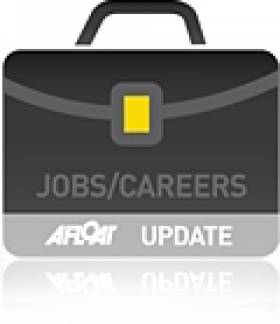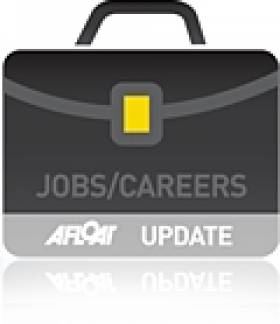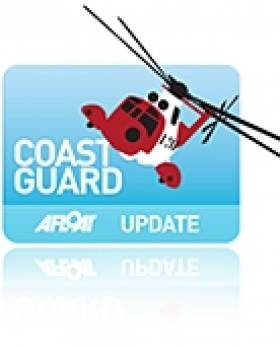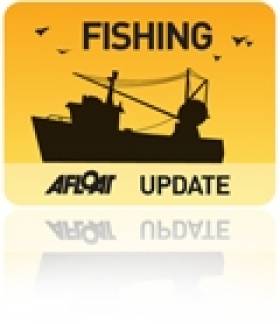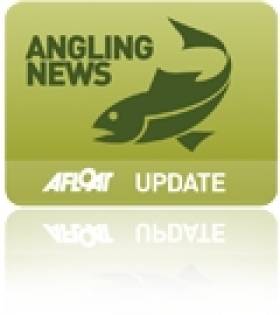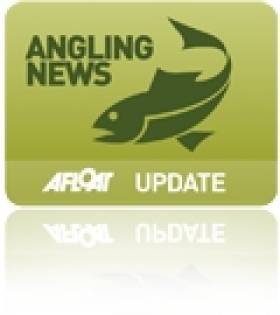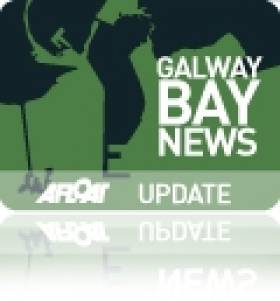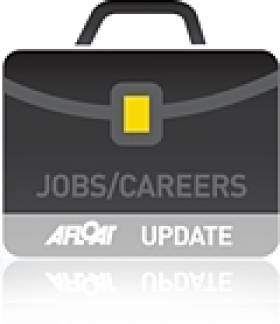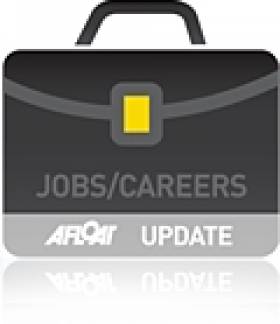Displaying items by tag: jobs
Irish Maritime Development Office Seeks Director
#marinejobs – The Marine Institute is seeking to employ a Director for the Irish Maritime Development Office (IMDO). A member of the senior management team, the Director will lead a small team providing a wide range of services both to the public and private sector, such as business development, policy support, market intelligence, education and contributing to the formulation of sectoral strategies. A key deliverable is the provision of reports and advice to the Department of Transport, Tourism and Sport, including the quarterly Transport Economist.
The Director will be primarily responsible for managing the process of innovation and strategy to support the continuous growth and development of the shipping services sector in Ireland. They will be engaged at a high level supporting development with maritime companies and organisations in Ireland while working with major international shipping groups and shipping lines already doing business in Ireland.
The successful candidate will work closely with government departments, external parties and key stakeholders, providing market intelligence and critical inputs to policy advice or future development and support
To be successful, the candidate will have a minimum of ten years direct experience in the national and international shipping sectors, ideally in the areas of ship management, ship broking, finance or maritime economics. The candidate will also have a relevant degree or equivalent professional qualification and experience. The candidate will have successfully managed programmes, people and resources at a senior and strategic level and been involved in communicating and building relationships with stakeholders.
A detailed job description can be downloaded from the current vacancies section of our website at www.marine.ie.
If you meet all of our requirements, we would be delighted to hear from you. Please send your letter of application and an up to date CV to Catherine Johnston, Human Resources Manager, Marine Institute, Rinville, Oranmore, Co Galway or email to [email protected]. Please note email applications will only be accepted at this address and applications are not valid until you have received confirmation of your application.
The closing date for receipt of applications is 17:00 on Tuesday 7th January 2014. Late applications will not be accepted.
The Marine Institute is an equal opportunities employer.
Maritime Jobs Focus at IMERC Annual Conference in Cork Harbour
#jobs – The potential of disruptive innovation to positively effect job creation in the maritime sector will be explored at the IMERC Annual Conference which takes place at the National Maritime College of Ireland in Ringaskiddy, Co. Cork on Monday 7th October. A disruptive innovation is an innovation which disrupts, improves and replaces an existing product, process, approach or idea over time in unexpected ways. IMERC, the Irish Maritime and Energy Resource Cluster, is a partnership between University College Cork, Cork Institute of Technology and the Irish Naval Service.
Speaking in advance of the conference, IMERC Director, Dr Val Cummins said: "Ireland currently derives just 1% of its GDP from the maritime sector. To put that figure in context, the UK derives 5%, Denmark 11% and Norway 20%. Ireland aims for 2.4% by 2030. The ideas and plans that will emerge from the IMERC Conference will be an important opportunity to drive growth in the figures for Ireland."
Ireland has the largest maritime area to land mass in the EU and is the third largest territory in the EU when its seabed is included. The maritime sector has huge growth possibilities for the Irish economy. This Conference is set to make a tangible contribution to the realisation of this potential by bringing together speakers and guests from North America and Europe from a range of backgrounds including industry, government, and academia, to discuss the role disruptive innovation can play in driving this sector. The conference will have an innovative format with audience engagement central and social media playing a vital role. IMERC is already making a big contribution to this sector with advanced plans for the development of a research and commercial campus in Ringaskiddy.
Dr Cummins continued, "There is a huge opportunity for Ireland to really benefit from its ocean resources in a planned manner for the first time in our history. The construction of the Beaufort Research Centre and the continuing ability of IMERC to attract new business are demonstrable indicators that IMERC is contributing to these aims."
IMERC's vision is to become a research and commercial cluster of world standing by realising Ireland's potential in the global, maritime and energy markets of tomorrow. See www.imerc.ie
Concerns Over Staffing Levels At Belfast Coastguard
#Coastguard - The UK's Maritime and Coastguard Agency (MCA) has attempted to assuage concerns over Northern Ireland's only coastguard control centre as a major union accused the service of staffing shifts below safe levels.
As the News Letter reports, this week the Public and Commercial Services Union (PCS) claimed that around 40% of shifts at the coastguard station in Bangor on Belfast Lough have been understaffed for more than a year.
The station at Bregenz House covers all of Northern Ireland and much of Western Scotland - an expanded brief resulting from the streamlining the UK's coastguard network, a plan in which Belfast was narrowly saved from the chop.
The MCA countered the MCA's allegations, claiming that a recent recruitment campaign had filled 28 vacancies for watch officers, and that other centres in the UK carried the load when staff levels were low.
Earlier this year the Belfast rescue co-ordination centre manager Richard Newell resigned from his post some weeks after the station took on extra responsibility with the closure of Clyde coastguard n Scotland last December.
#FishFarm - Bord Iascaigh Mhara (BIM) has responded to concerns from environmental groups that an ingredient in treatments for sea lice in salmon farms poses a threat to wild marine life.
As Galway Bay FM reports, campaigners Galway Bay Against Salmon Cages - one of the groups opposed to the planned Galway Bay fish farm - say that cypermethrin, an active ingredient in veterinary medicine used to treat sea lice, is toxic to aquatic organisms.
BIM aquaculture manager Donal Maguire attempted to play down fears over the use of the pesticide, saying it has been fully tested for toxicology in the marine environment.
However, another campaign group claims BIM's position is contrary to the manufacturer's own warnings on the use of the drug.
According to FishNews.eu, Friends of the Irish Environment (FIE) cited the Irish Medicines Board's product description for cypermethrin, which states that it is "dangerous to fish and other aquatic life" and demands that the chemical "should not be allowed to contaminate water".
FIE went on to describe cypermethrin as "a biocide which kills life, not a medicine that saves lives" and as "a highly active neurotoxin" with "known effects on fish and, most sensitive of all, crustaceans such as crabs and lobsters. Bathers and watersports [enthusiasts] may also be at risk."
Earlier this month, Inland Fisheries Ireland (IFI) expressed "serious concerns" over the findings of a study on wild salmon in Ireland that claimed fish farm schemes were less harmful to wild fish than pollution and possibly even beneficial to wild catchments.
IFI is among the significant opposition to BIM's proposed organic salmon farm off the Aran Islands, a 500-hectare project that would be the largest of its kind in Europe and create hundreds of jobs in the locality.
Angling Worth €0.75bn to Irish Economy Annually
#Angling - Minister of State for Natural Resources Fergus O’Dowd has warmly welcomed the findings of a new national economic study that reveals for the first time that angling and angling tourism in Ireland are generating a dividend in excess of €0.75 billion within the Irish economy every year.
The study, commissioned by Inland Fisheries Ireland (IFI), shows direct spending on angling in Ireland amounted to €555 million in 2012, with indirect spending worth an additional €200 million and totalling €755 million.
Recreational angling was also found to directly support 10,000 existing Irish jobs, many of which are located in the most peripheral and rural parts of the Irish countryside and along our coastline.
The study - titled a Socio-Economic Study of Recreational Angling in Ireland - found that 406,000 people were involved in recreational angling in Ireland last year, with over 150,000 of these travelling from Northern Ireland and overseas.
Over a quarter of a million Irish adults (252,000) held a fishing rod last year with sea angling along with salmon and brown trout angling seen as the most popular categories where domestic anglers are concerned.
The quality of the Irish angling product, the friendliness and hospitality of the Irish people and our outstanding scenery were cited amongst the principal attractions of Ireland as an international destination for recreational angling. Tourism angling spend is estimated at approximately €280 million on an annual basis.
Speaking at the launch of the study at the Royal College of Physicians on Kildare Street, Minister O'Dowd admitted that the findings had come as a surprise, as this was the first national survey which was able to put a value on angling to the economy and that up till now the economic significance of the sector had been greatly underestimated.
The minister said the study not only highlighted to him the major economic impact that angling makes to the Irish economy, but it also underlined the need to continue to protect and nurture this valuable resource, if it is to be allowed to develop and grow to achieve its full potential.
“The results contained in this report are significant,” he said. “Angling, as a recreational pursuit, is a major contributor to the fabric of Irish life in all parts of the country, particularly in rural and peripheral areas.
"From the industry perspective, the strategic development and marketing of our angling product is essential and has been given new impetus in light of what we now know about the visiting and spending patterns of anglers and what is important in drawing them here.
He added that it is "equally clear to me that maintaining a strong focus on the protection and conservation of this vital resource into the future is absolutely key if we are to properly sustain and grow these benefits to anglers, angling businesses and the Irish economy.”
The study, commissioned by IFI in early 2012 and undertaken by consultants Tourism Development International, was undertaken to help underpin effective strategic planning and decision making in respect of the angling product’s development and marketing.
IFI chief Dr Ciaran Byrne commented at the launch that the national fisheries agency “will now review the results of the survey in conjunction with our stakeholders. Clearly fish stocks and fish habitat must be conserved, protected and developed. Angling businesses must be given every opportunity to win business and secure and grow the jobs within the sector.
"IFI is committed to these goals and together with our stakeholders and the support of Government, state agencies and a new angling marketing and development plan we will achieve them.”
The study is available to download from the IFI website HERE.
#Angling - Ireland's recreational angling sector generates more than half a billion euro annually, according to the Minister for Natural Resources.
As the Irish Examiner reports, Minister Pat Rabbitte revealed the significant figure in a written response to a Dáil question by Tommy Broughan TD, who requested a breakdown of the number of people participating in all forms of angling in the State.
The minister went on to confirm that the angling industry "sustainably supports more than 10,000 jobs... particularly in the West of Ireland".
Minister Rabbitte's announcement comes ahead of the pending publication of an Inland Fisheries Ireland study on Ireland's angling sector. Afloat.ie will have the latest on that when it appears.
Elsewhere in Ireland, the Belfast Telegraph reports that a man has been found guilty of a number of fisheries offences at Belfast Magistrates' Court.
Derek Ferguson of Larne was fined a total of £225 (€265) for unlicensed angling, unauthorised entry to fisheries and using unlawful angling methods.
Galway Port Plans Must Look To The Future Says Ex Statoil Head
#GalwayPort - A former director of Statoil has said Galway needs to look "10, 20 or 30 years ahead" to make use of the vast potential of the marine sector amid plans for the redevelopment of the city's port.
As the Galway City Tribune reports, Stein Bredal made a six-day visit to the City of the Tribes during which he proposed that proper management of the Galway Port scheme would create thousands of long-term jobs across a number of sectors.
He posited his home city of Stavanger in Norway as an example to follow. The city - with double the population of Galway - has become a service hub for Norway's west coast oil and gas fields.
And Bredal believes Galway could become the same for Ireland's offshore reserves, not to mention tourism (in the form of local hospitality and berths for cruise liners) and aquaculture (such as the proposed deep-sea organic salmon farm off the Aran Islands).
“You need someone in this city to think 10, 20, or 30 years ahead," he said. "You need to give hope to the young generation, that they don’t need to emigrate to Australia or New Zealand, that the service jobs can be located here."
As previously reported on Afloat.ie, fast-tracking of pans for the €200 million redevelopment of Galway Port is on the cards thanks to a clause in EU regulations that allows for planning applications to be made under IROPI (Imperative Reasons of Overriding Public Interest) legislation.
IFI Recruiting Seasonal Fishery Officers
#Jobs - Inland Fisheries Ireland (IFI) is currently seeking to recruit a number of staff as fishery officers nationally for periods of up to a maximum of six months' duration during 2013 and will shortly commence a process to fill these positions. Interviews are expected to take place from 9-11 April 2013.
Fishery officers will be primarily concerned with the implementation and enforcement of the provision of the Fisheries Acts, Water Pollution Acts and other relevant statutory provisions.
The successful candidates are required to provide, in co-operation with other fisheries staff, comprehensive conservation and protection services, inland and at sea - as well as comprehensive improvement, and development and fisheries management support services – within any part of a fisheries district and/or any other area assigned within one or more fisheries districts.
A number of positions will be concerned with assisting either directly or indirectly in fisheries related research projects.
Salary will be at the first point of the fishery officer scale (€22,349) plus an unsocial hours allowance paid at either 50% or 100% relative to the number of unsocial hours worked.
Applications (a cover letter and up-to-date CV) should be posted for the attention of Norma Brophy, Inland Fisheries Ireland, Swords Business Campus, Swords, Co Dublin or via email to [email protected] by close of business on Monday 18 March 2013. Please note that late applications will not be processed. Enquiries to Norma Brophy at 01 884 2662.
Cork To Host Workshop On EU 'Blue Growth' Strategy
#MarineResources - The fifth and final Regional Consultative Atlantic Forum Workshop will be held at University College Cork from 4-5 March 2013.
Following previous workshops in Horta, Brest, Bilbao and Cardiff, the two-day event will input to the definition of the European Union Strategy for the Atlantic Action Plan (2014-2020).
Blue growth and creating sustainable jobs are at the heart of the Atlantic Action Plan, which will focus on harnessing the enormous untapped economic potential of Atlantic coasts, seas and oceans.
According to the Marine Institute, ocean energies, seabed mining, marine biotechnology and other emerging sectors, as well as a revitalisation of traditional activities such as fisheries, aquaculture and tourism – driven by research, technology and innovation – can contribute to the development of a 'blue economy' in Europe that can provide jobs and spur economic growth.
New advances in science and technology place us in a unique position to benefit from the sea's economic potential in a sustainable manner, the institute adds.
Implementation of the Atlantic Action Plan may be co-funded through a variety of member state and EU funds (Cohesion Funds, INTERREG-V, EMFF, Horizon 2020, etc) as well as via the European Investment Bank and Public-Private Partnerships.
The Cork workshop will be opened on Monday 4 March by Marine Minister Simon Coveney and Lowri Evans, EU Director General for Maritime Affairs and Fisheries (director general, MARE). Day 1 will include parallel sessions to address the Research and Innovation and Atlantic Ports components of the Atlantic Action Plan. Day 2 will provide an overview of the Atlantic Action Plan including priorities, funding and implementation.
Speakers will include the director general of MARE and representatives of REGIO, RTD, MOVE, the European Investment Bank, European Parliament, Committee of the Regions, Economic and Social Committee as well as member state and regional representatives.
The Atlantic Action Plan aims to create sustainable jobs and growth by bringing together the five EU countries with an Atlantic coastline (France, Ireland, Portugal, Spain, United Kingdom) plus regional and local authorities, business and other stakeholders to identify key investment and research priorities, as well as concrete co-funded project ideas.
For further information, workshop programme and registration click HERE.
Howth Yacht Club Seeking To Recruit Club Manager
#Jobs - Howth Yacht Club is seeking to recruit a person for the position of Club Manager, a new position incorporating overall responsibility for the management of the club including administration, marine and hospitality.
Responsibilities for the Club Manager will include management of all facilities and activities, direct management of all staff, contract management and regulatory complacence, financial management and marketing. The Club Manager candidate will report to the General Committee of the HYC.
The ideal candidate will have a proven track record in senior management and have strong interpersonal skills.
The closing date for applications is Friday 18 January. A full job specification and details of how to apply are available at the Howth Yacht Club website HERE.


























